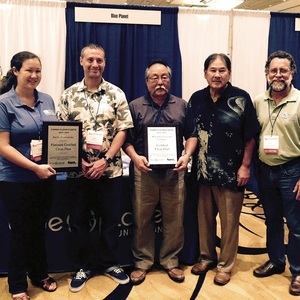Pacific Biodiesel receives Platinum Certified Clean Fleet award

Photo: Pacific Biodiesel Technologies
September 9, 2015
BY Ron Kotrba
Pacific Biodiesel Logistics, the grease collection division of Hawaii-based biodiesel technology firm Pacific Biodiesel, has received the Platinum Certified Clean Fleet award from Blue Planet Foundation and Honolulu Clean Cities as part of the new Hawaii Clean Fleets certification program.
The platinum certification is the program’s most prestigious level, reserved for public or commercial fleets that exclusively use renewable fuels or electricity for all vehicles in their fleets. Only one other organization—Extended Horizons Inc.—received the same platinum award.
Advertisement
Three additional organizations—Hawaii Electric Light Co., the Honolulu Board of Water Supply and Dependable Hawaiian Express—received Certified Clean Fleet awards, which recognizes organizations that are making significant progress in clean transportation by incorporating renewable fuels and fuel efficiency strategies into their vehicle fleets.
“These organizations are stepping up to the plate as leaders in Hawaii, helping the state’s economy by reducing petroleum imports while minimizing their environmental footprint,” said Shem Lawlor, clean transportation director for Blue Planet Foundation. “The Clean Fleets program gives us an opportunity to recognize their tremendous efforts and to demonstrate to others what is possible.”
Blue Planet Foundation presented the certification awards at the Hawaii Transportation Association annual meeting Aug. 27-28 at the Sheraton Kona Resort.
Advertisement
Modeled after the U.S. Green Building Council’s Leadership in Energy & Environmental Design (LEED) certification program, the Hawaii Clean Fleets program recognizes businesses, organizations, and government agencies who are making progress on renewable fuels, conservation and fuel-efficiency measures in their vehicle fleets and transportation operations.
Transportation accounts for more than 60 percent of the energy consumed in Hawaii. Nearly half a billion gallons of fuel were consumed last year in Hawaii by ground transportation alone.
“Using renewable fuels and fuel efficiency measures can help reduce Hawaii’s dependence on imported fossil fuels,” Lawlor said. “Alternative fuels and efficient driving practices contribute to a more sustainable future for Hawaii’s transportation industry—we’re moving the state towards a 100 percent clean-energy economy.”
Related Stories
Luxury North Dakota FBO, Overland Aviation—together with leading independent fuel supplier, Avfuel Corp.— on May 19 announced it accepted a 8,000-gallon delivery of sustainable aviation fuel (SAF) on May 12.
Neste and FedEx, the world’s largest express cargo airline, have agreed on the supply of 8,800 metric tons (more than 3 million gallons) of blended Neste MY Sustainable Aviation Fuel to FedEx at Los Angeles International Airport (LAX).
Wheels Up Experience Inc. on May 6 announced the launch of its new SAF program, under which Wheels Up will partner with Delta Air Lines to purchase SAF, allowing private fliers to participate regardless of their flight operator or departure airport.
Germany-based Mabanaft on April 17 announced it started to supply SAF to airlines at Frankfurt Airport in January. The company said it will deliver more than 1,000 metric tons of SAF to the airport this year under the European SAF mandate.
easyJet and ATOBA Energy, in partnership with World Fuel Services, announce the signing of a memorandum of understanding for the development of long-term supply of SAF for easyJet’s operations in Europe and the U.K.
Upcoming Events










